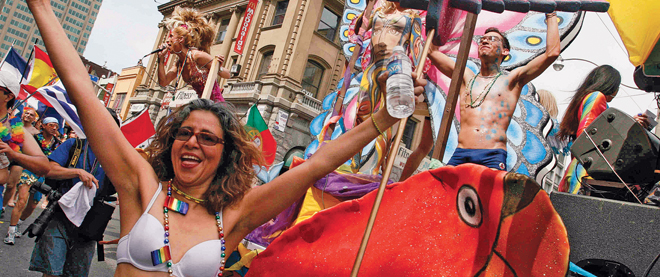Sorry Rob, the gay pride parade is part of the job
Andrew Potter on the ritual humiliations that come with being a politician
Tory Zimmerman/TORONTO STAR
Share

From kissing babies to sitting through interminable public ceremonies, the cost of being a politician in a democracy is that you have to submit to a handful of ritual humiliations simply because the people expect it. The prime minister of Canada has to pretend to like hockey. The American president has to attend church and otherwise act like he believes in God. Even Kim Jong Il has to feign interest in mundane things. As for the mayor of Toronto, he has to march in the annual Pride parade that celebrates the diversity of human sexuality in the city’s lesbian, gay, bisexual, and transgender (LGBT) community.
The current holder of that office, Rob Ford, does not agree. He has made it clear that he has no intention of attending the annual parade, which often takes place over the July 1 long weekend. And despite being strongly encouraged to change his mind by virtually every newspaper columnist and editorialist in the land, Ford is digging in. Yet oddly enough, it is the mayor’s own bizarre recalcitrance that forms the strongest argument for why he needs to be there.
There are actually a number of reasonable arguments to be made in support of Rob Ford’s position. To begin with, suppose we take at face value his claim that it’s nothing more than a scheduling problem, that the Pride parade conflicts with a decades-old Ford family tradition of spending the weekend at the cottage in Huntsville, Ont. To the extent to which Pride is about engendering respect for love in all its plenitude, a magnanimous LGBT community should be willing to grant him his traditional hetero-normative family time.
Besides, Toronto is no longer the city it was in 1981, when Toronto police raided four gay bathhouses and arrested over 300 men. Pride evolved out of the mass protests that were a direct political response to those raids, aimed at defending the rights of the city’s gay community. Today, it’s a 10-day festival of arts and culture, attracting corporate sponsors that include TD Bank, Budweiser, Pizza Pizza, and CTV. Whatever stigma there ever was in a corporation being associated with the LGBT community, it is fading fast. We might be tempted to go even further, and argue that the day the mayor no longer needs to attend Pride will mark the utopian end point of that trajectory—the normalization, even banalization, of the lifestyle of what was once a persecuted and marginalized community.
Finally, a lot of the pressure on Ford to attend Pride is reminiscent of the old episode of Seinfeld where Kramer decides to participate in the AIDS walk, but refuses to wear the AIDS ribbon. “This is America, and I don’t have to wear anything I don’t want to wear,” he exclaims, right before he’s assaulted by a crowd of politically correct ribbon-bullies. Kramer has a point, though. While a liberal society can require that people be gay-neutral, it cannot demand—legitimately, liberally—that everyone be gay-positive. No one should be forced to wear the ribbon.
No one, that is, except elected officials. Unlike citizens, who merely need to accept the commands of the law, political leaders need to be seen as endorsing its spirit, in the name of representing their entire constituency. Unfortunately, Canadian politicians don’t have a great record on this. When Pierre Trudeau decriminalized same-sex sexual activity in 1969, he didn’t say there was nothing wrong with gay sex. He said, famously, that the state has no business in the nation’s bedrooms. When same-sex marriage became law in 2005, it was largely a judicial, not legislative, victory that was forced upon Paul Martin by the Supreme Court. And while he was more than willing to concede the Charter’s supremacy on the issue, the deeply Catholic Martin was never able to come right out and say that he thought it was right and proper that gays should be allowed to marry.
When it comes to Rob Ford, the concerns are even more serious. The “I have my own family tradition” excuse might be more persuasive if Ford didn’t have a long history of insensitivity toward the gay community (he once said that financial support for a video about gay issues was “absolutely disgusting”) and of opposition to the Pride festival itself (he has repeatedly threatened to withdraw city funding for the parade, ostensibly over the participation of a group called Queers Against Israeli Apartheid.)
Toronto’s Pride parade is the third-largest in the world. Out of the top 10—including New York, London, San Francisco, Sydney, and Amsterdam—Toronto’s will be the only one where the host city’s mayor won’t be marching. If Rob Ford were gay-neutral, he would surely suck it up, drive back from the cottage a day early, and go to the parade. But when asked directly last week if he was homophobic, the Toronto Star reported that Ford simply “looked away and mumbled something unintelligible under his breath.”
If the mayor of Canada’s biggest and most cosmopolitan city can’t bring himself to even pretend to celebrate the sexual diversity of his city, then the utopia of banal acceptance is not even remotely at hand. Which leaves us with a bit of a logical conundrum, which we can call the Paradox of Ford: why should Rob Ford attend Pride? Because there are still people like Rob Ford around.